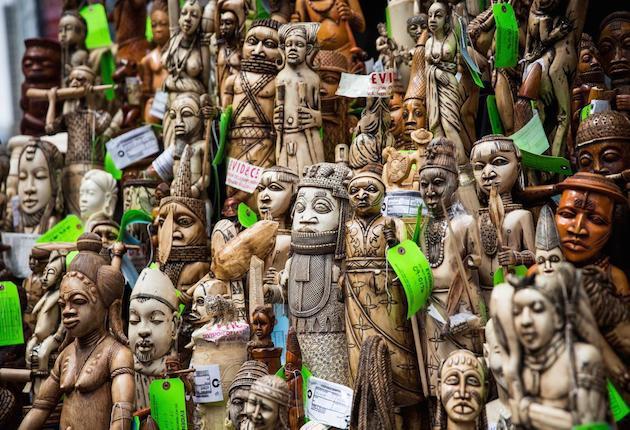Ornate ivory figurines wait to be destroyed in the New York Ivory Crush 2015. Photo courtesy of Andrew Burton/Getty Images.
Hundreds gathered and thousands watched online Friday as over 2,000 pounds of illegal ivory rode a conveyor belt up and down into a rock crusher in Times Square. The US Fish and Wildlife Service and other wildlife and conservation organizations hosted the June 19 event, which featured ivory confiscated from New York and Philadelphia. Intricately carved tusks, ivory figurines, and other “trinkets” — a word frequently used by the speakers and media correspondents to describe the ivory’s frivolous use — sat waiting to be destroyed.
Called the New York Ivory Crush 2015, the event is one of several that has taken place over the last few years in an effort to bring attention to elephant poaching and to help fight it. The efforts of the US, the Republic of Congo, France, and other countries have led to roughly 300,000 pounds of ivory being destroyed. Still, according to a Wall Street Journal interview with John Calvelli, Executive Vice President of the Wildlife Conservation Society, there are “35,000 elephants being killed, literally, every year, 96 a day, to really help sell these trinkets, and it’s really because of the growth in the middle class in East Asia, but the problem is right here in the US as well.”
The profits from selling illegal ivory also helps fund terrorism, according to Calvelli. Groups like the Lord’s Resistance Army and Al-Shahaab, the group responsible for the 2013 Westgate mall bombing in Nairobi, use the sale of poached ivory to carry out their attacks.
Much of the illegal ivory is sold on the Chinese black market. China’s is one of the largest markets in the world for illegal ivory, but things may be shifting there for the better. China held its own ivory crush in 2014 and has made a one-year ban on importing ivory carvings in 2015, with statements made that these are just the first steps toward a total end of ivory trading.
“China is listening, and I think China has really been very thoughtful about it. About two weeks ago, they announced that they’re going to be working toward closing their ivory markets,” Cavelli said.
With China seemingly on board and the US working to prevent trafficking within its borders, the hope of environmental and government organizations seems to be that the two biggest markets will close and the ability to sell poached ivory will be severely hindered. With numerous crushes already held and the scourge of poaching still raging, the question is, will destroying the supply destroy the demand?
Conventional wisdom says no. The scarcity of ivory will almost certainly drive up demand while the supply that still exists will grow in value.
Africans themselves realize the futility of bans and gestures that have good intentions and not much else.
In an August 7, 2014, interview with The Dallas Morning News, minister of Tanzania Natural Resources and Tourism Lazaro Nyalandu said the US ban of illegal ivory importation “benefits the poachers. It only assures that more elephants will get killed.”
The real-world solution to poaching lies in putting a price on an elephant for more than its ivory. Ecotourism does this to some degree, but only with money. Hunting, on the other hand, provides both money and meat to locals, all while working within the confines of sustainability to ensure the elephant population isn’t used up and extirpated from a region.
When a hunter kills an elephant, the meat goes to the locals to provide literally tons of meat for consumption. Problem animals can be referred to professional hunters and taken by their clients, removing the danger and again providing meat. Poaching might remove a problem elephant by chance, but the ivory will only fund the poachers and their associates. The meat of the mutilated and likely poisoned animal will be left to rot in the African sun.
Hunting also provides money directly to the local community. With a steady stream of hunting clients visiting a PH’s conservancy, money is spent in the nearby towns and villages. The money in turn provides jobs, giving locals an incentive to protect elephants. Why would locals encourage and support poaching when they and their relatives benefit more from legally harvesting an elephant?
While many weep, wail, and gnash at hunters for even killing one elephant—whether it’s a tuskless elephant for herd management or a big bull for the dreaded s-word, sport—hunting is a vital and viable tool for reducing poaching in Africa. The danger lies in believing preservation of all elephants is the only alternative to the senseless killing of animals. Conservation and the important part hunters play in it continues to be needed for the well-being of elephant populations in the 21st century.
We welcome the crushes, but if the plight of the elephants is going to improve, legal hunting needs to be the cornerstone of the management equation.
To view the interviews cited, visit:
The Wall Street Journal’s YouTube page
The Dallas Morning News
Subscribe to the free daily newsletter to receive Sporting Classics stories directly to your inbox!

